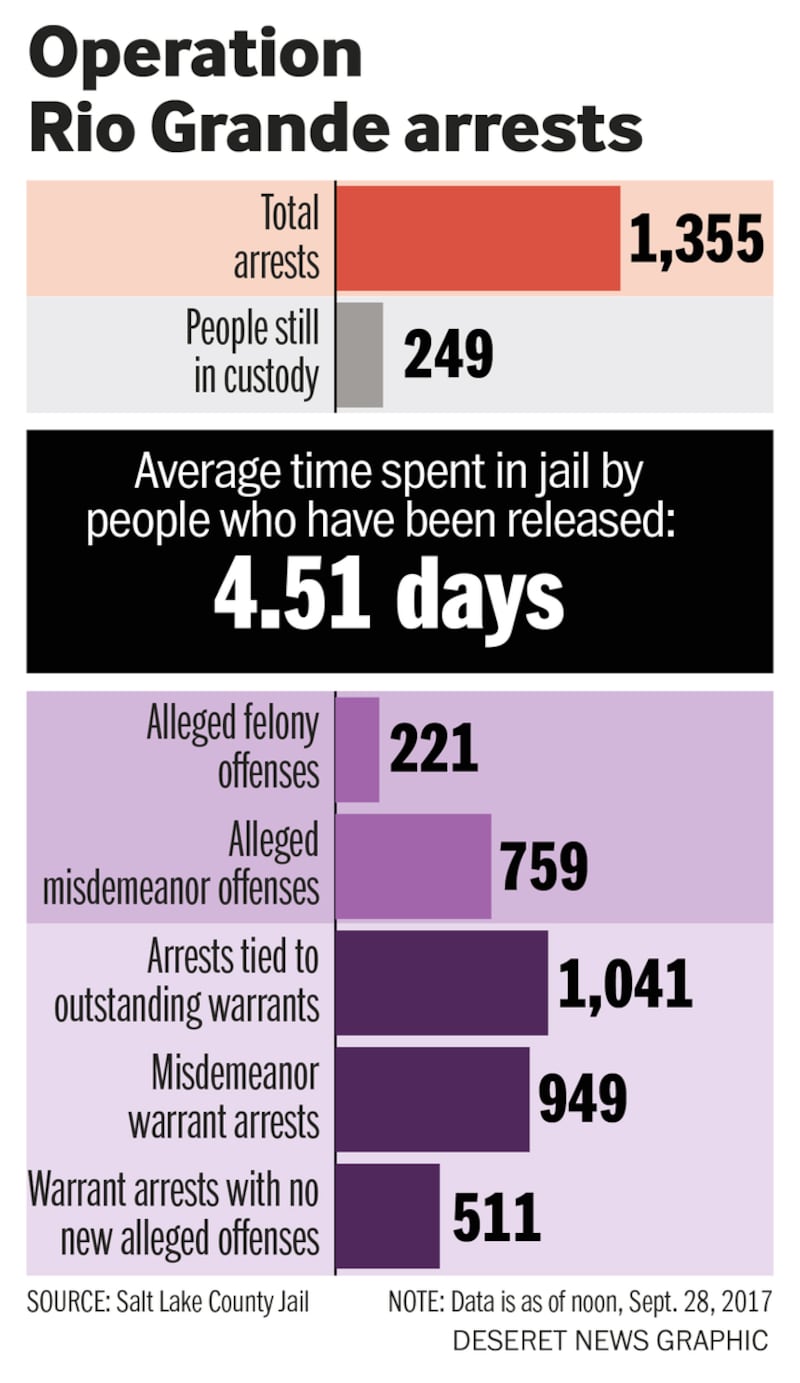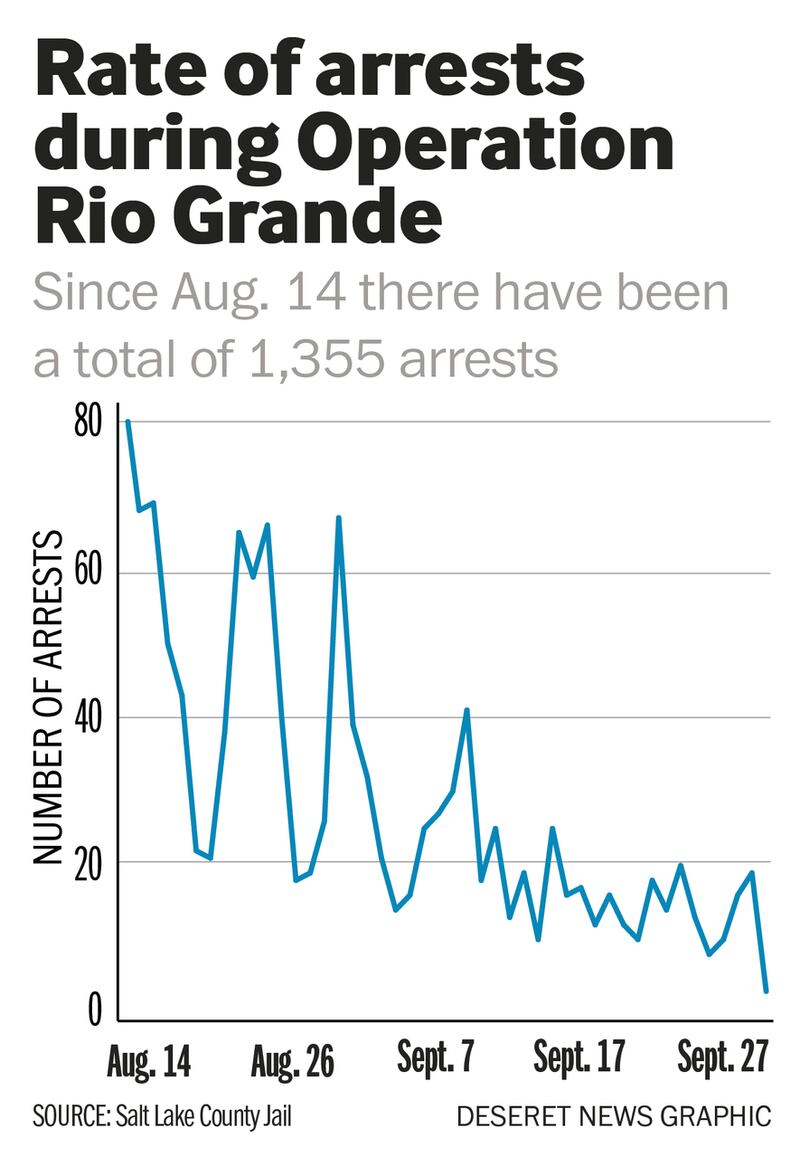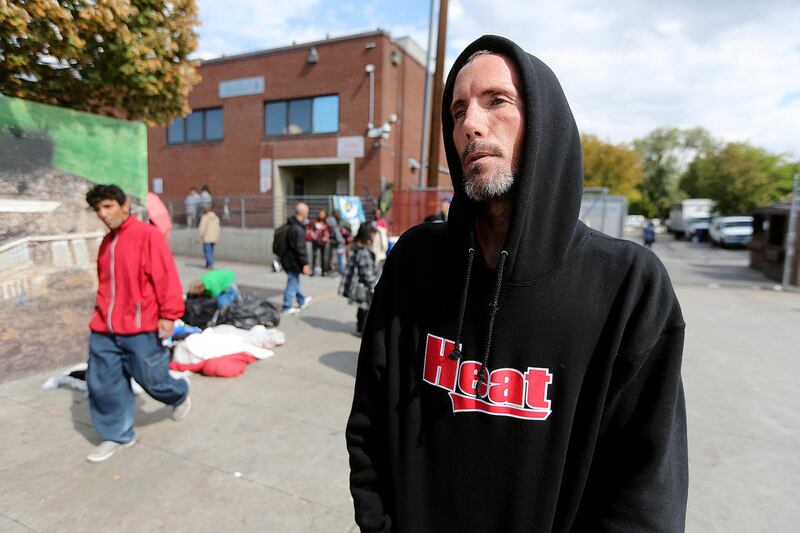SALT LAKE CITY — Emil Wells was asleep on the sidewalk on Rio Grande Street when police found him.
The next thing he knew, he was in handcuffs and on his way to the Salt Lake County Jail. His arrest, on Sept. 9, became a statistic — one of nearly 1,400 arrests since Operation Rio Grande began last month.
Wells' offenses: Five outstanding warrants carrying a combined $6,635 price tag for possession of drugs and paraphernalia, shoplifting and criminal trespassing.
But Wells, 33, was back on the streets after spending just eight hours in jail — booked and released, warrants still in his name — because there wasn't room for him to stay. And thanks to the pipe the officer found in his pants pocket, he is now charged with possession of drug paraphernalia, a class B misdemeanor.
When the jail cut him loose, three of the four warrants against him were recalled when he signed a form agreeing that he would call the justice court to schedule a hearing, then appear in court within 14 business days.
The fourth — which is before a different judge and involves the most serious charge Wells currently faces, a class A misdemeanor for possession of a controlled substance — was reissued two days later, ordering police to arrest him.
To Wells — who admits he's addicted to Spice — Operation Rio Grande is a waste of time.
"It's ridiculous," he said, standing outside the Road Home's downtown shelter this week. "It's making things worse. They release us, then put a warrant out for our arrest again? They should just set up a court date for us. But they don't do that."
Wells said the warrants only stop him from finding housing so he can finally leave the Road Home. He said he came to Salt Lake City from Indianapolis after losing his job, but his luck never turned for the better.
Meanwhile, as those warrants hang over his head, Wells said waitlists for drug treatment programs are "way too long."
"They say they're out here helping us. But they're not helping us," he said.
'A lot of sheep'
State, county and city leaders have lauded Operation Rio Grande as the right mix of treatment and law enforcement to eradicate the lawlessness that has festered in Salt Lake City's most troubled neighborhood. House Speaker Greg Hughes has said it's meant to capture "the worst of the worst" — drug dealers, thieves and other "wolves" preying on and hiding among the homeless.

But an analysis of Operation Rio Grande's arrests shows that most arrestees are low-level offenders — many with outstanding warrants from months or years earlier — who remain caught in the ever-spinning revolving door of the county's overcrowded criminal system.
Looking at the list of offenses backing the growing list of arrests, Anna Thomas, spokeswoman for the American Civil Liberties Union of Utah, says the data doesn't match up with stakeholders' promise to "separate the wolves from the sheep" in the Rio Grande area.
"We can extrapolate from the data that there are a lot of sheep that we just put in jail — and there are certainly hundreds of vulnerable sheep that now have additional criminal charges against them or have bail they have to pay," she said. "So we definitely didn't make life any easier for those people."

According to data from the Salt Lake County Jail, out of 1,355 arrests recorded as of Thursday, 1,041 were tied to outstanding warrants. And the majority of those arrests — 949 — include misdemeanor-level warrants.
An analysis by the Deseret News of the completed data indicates that 511 arrests made in Operation Rio Grande so far have been due exclusively to warrants, without any new offenses attached to them.
Data provided by the jail is updated online on an ongoing basis; some entries remained incomplete as of midday Thursday when the data was analyzed.
Salt Lake Police Chief Mike Brown said the vast number of people with outstanding warrants running rampant in the Rio Grande area dates back to last year, when former Salt Lake County Sheriff Jim Winder established booking restrictions because of overcrowding at the jail, limiting cells for those accused of felony offenses or certain violent misdemeanors.
That put Salt Lake police in a tough spot, Brown said. Even though they couldn't take some offenders to jail, that didn't mean they stopped enforcement.
Many were arrested for low-level offenses but were only given citations since the jail wouldn't accept them. If they didn't appear in court to face those charges, warrants were then issued for their arrest.
"Some of these folks had 10, 15, 20 warrants that they've accumulated during that time. During that 15 months where we had jail restrictions, the warrants in Salt Lake City skyrocketed," Brown said.
Some arrestees have told the chief it was "a perfect climate to do drugs all day long," he said.
They also told him that they knew there would be little consequence from the citations they racked up and the warrants that subsequently followed.
While stakeholders behind the intensive law enforcement push through the Rio Grande neighborhood say they are working to extricate predators preying on the homeless while helping those chained to addiction, the jail's numbers show that the bulk of the operation's arrests are people like Wells.
According to the data, officers have made 759 arrests based on misdemeanor-level offenses, compared to 221 felony-level arrests.
After a series of conversations with residents in the Road Home shelter, Utah Department of Public Safety Commissioner Keith Squires said Thursday that the people he has spoken with are grateful for the impact Operation Rio Grande is having on public safety.
"People are saying thank you to our officers, they're recognizing that the conditions are much improved as far as safety and security," he said. "They recognize that there's a criminal element that wants to be able to continue to provide drugs into that area, and every time they attempt to re-enter that area, we have officers available and alert to that, addressing it head on."
The revolving door
Officers patrolling the streets as part of Operation Rio Grande haven't been told to focus on specific kinds of enforcement, Squires says, but were given "the discretion to go in and deal with every situation they encountered."
As of midday Thursday, 249 people arrested as part of the operation remained in jail, having been in custody for as many as 44 days, based on when they were booked. The rest have been cut loose, spending an average of 4.51 days in jail.
While 300 additional jail beds were secured before the initiative began, the leading reason for release is overcrowding, according to the jail's data.
Salt Lake County Sheriff's Sgt. Cammie Skogg said those added 300 beds were full within days of Operation Rio Grande getting underway. Now, anyone booked on third-degree felony offenses or below, who meet certain criteria, are released due to overcrowding, she said.
Because warrants must be resolved in court and not in jail, when offenders are booked on warrants and quickly released again, Skogg said, there's no guarantee their warrants will be taken care of before they go.
"We try to make them aware of any information they have about upcoming court (dates), but with warrants it's a completely different issue," Skogg said. "Obviously the person knows they have warrants, obviously they know they're getting released without taking care of them.
"The simple answer would be that they follow up and go to court, but we know a lot of them are indigent, are homeless and don't have the resources to help them in doing that, which is why people end up with 30 or 40 warrants."
And as the arrests stack up, Squires acknowledges some people have been arrested, booked and released multiple times: 125 people have been booked twice, 24 people have been booked three times and four people have been booked four times.
The person who has been arrested the most is a 37-year-old man, who has been booked into jail six times for misdemeanor offenses and infractions including intoxication, having an open container in a public place, obstructing justice, assault, giving false information to police, trespassing, littering and disorderly conduct.
Out of those arrests, the man has been released five times due to overcrowding, according to the jail's data. Following his second arrest, he remained in custody for five days.
The rate of arrests has slowed, however, dropping from 81 arrests on the first day of the operation to just 20 on Wednesday.
State, county and city leaders maintain Operation Rio Grande isn't only about arrests. Phase two of the effort focuses on treatment, including through 37 new treatment beds, which is promised to grow to 240 by the end of the year, and a newly formed, 125-person drug court.
A third phase incorporating job training and placement is in the works.
It's all part of Operation Rio Grande's $67 million price tag, which is banking on about $6 million anticipated from Medicaid waivers that state officials say are expected to be approved by the end of the year. And if the waivers don't come through, state leaders say they're committed to finding the money elsewhere.
'Flooding' the system
However, years of "systematic neglect" to programs addressing substance abuse, transitional housing and mental health has shifted the burden to the criminal justice system, Salt Lake County District Attorney Sim Gill says, at a level that won't be quickly made up.
The deficit is so large, he says, that the limited resources now pumping in through the operation aren't enough to stop the system's revolving door from spinning.
That's especially true, Gill acknowledges, for misdemeanor offenders.
"We knew that going into it that these misdemeanants would simply be released," Gill said. "But that reality of their release was inevitable because there isn't sufficient bed space there for them, and rightfully so, because you really do want to use that bed space for those predatory felons at the higher level of criminal violation. So the largest population, single population, which is cycling through, is that misdemeanant population."
And like the jail beds, treatment beds are prioritized for felony and class A misdemeanor offenders, Gill said.
With the growing commitment to supporting treatment and other services, Gill hopes resources will ultimately trickle down to misdemeanor offenders.
In the meantime, he says, restoring order to the Rio Grande neighborhood has reduced danger and chaos surrounding service providers in the area, encouraging those in need who have been pushed "to the periphery" to come in and seek help.
However, community-based services alone will not prove to be the solution to years of neglect, Gill warned.
"If we do not step up as a community or as a Legislature to address that need for that subset of the population, we might get a windfall from it for the short term, but it is not going to systemically solve anything," Gill said.
While Operation Rio Grande is slated to continue until June 2019, when the downtown shelter is set to shut down and three new homeless resource centers come online, Gill said his office is committed to keep following cases for an additional three years after that. He calls it "invested prosecution," tracking not only the outcome of a case but all that happens afterward.
Resolving those cases will include efforts to take care of other outstanding charges and warrants at the same time, Gill assured.
As arrests begin translating into new criminal cases, Gill acknowledges the burden on prosecutors is mounting. Thomas says the same is true for the defense attorneys who will eventually represent most of the people being swept up during the initiative.
Though she credited state and county leaders for including treatment beds in the Operation Rio Grande plan, Thomas said the upcoming caseload is creating a "troubling" problem in the county's legal system.
"All of these arrests now flooding into the system — it's a huge problem," she said, noting that the Salt Lake County Public Defender’s Association had to request nearly $400,000 in additional funds to hire more attorneys to work through all the cases.
Even still, Thomas worries the $368,000 that was awarded is not enough to adequately handle all of Operation Rio Grande's cases.
Disrupting bad behavior
Though he recognizes that the flood of arrests is quickly outpacing prosecutors' ability to screen the cases, Brown maintains the arrests are needed because taking offenders to jail, even just for a few hours, is better than just writing a citation that some just leave crumpled on the ground.
"Seriously, just to be able to interrupt people's bad behavior — to say, 'Nope, we're seizing your drugs and you're going to jail' — that has a huge impact on people's lives. … That front door to jail doesn't have to be the front door to incarceration — it can be the first door into treatment."
Christopher Tarver, who is homeless, agrees.
"It kind of was one of the best things that ever happened to me," he said, though at the same time he thinks the heavy police presence in Rio Grande is "overkill."
When Tarver was arrested on Aug. 7, shortly before Operation Rio Grande began, he had 13 outstanding warrants — several for drug possession, camping on public grounds, shoplifting, and one for driving with a suspended license.
He was booked into jail and released the same day, with three new pending misdemeanor charges for drug and paraphernalia possession because he allegedly had heroin and a syringe loaded with meth in his pocket.
At the time of his arrest, warrants in six ongoing cases against Tarver were recalled, according to court records. But they were all reissued after Tarver missed his court date, along with a new warrant tied to the new charges.
Less than a month later, on Sept. 1 in the midst of Operation Rio Grande, Tarver was arrested again — this time with 16 outstanding warrants. That time he stayed in custody for 14 days, participating in a hearing by video from the jail to resolve his cases.
Tarver pleaded guilty in three cases to retail theft, drug possession and possession of drug paraphernalia, while his remaining cases and warrants, including his latest one, were dismissed. He was later given credit for the time had spent in jail and was sentenced to complete 24 months in Salt Lake County's Intensive Supervised Parole program.
"I came out with nothing," he said of the cases against him. "I was glad to get them taken care of, that's for sure."
Now, he hopes to find a job so he can leave the Road Home shelter after more than two years.
Tarver said when he was in jail he wasn’t offered treatment for his addiction — he became hooked on pain pills following a motorcycle crash, which led to heroin use after his mother's death, he says — but he has friends who "took that deal" and are now at First Step House or Odyssey House to get clean.
His first priority, he says, will be to get a job "and get out of here." He intends to deal with his addiction later.
"I guess I'm a functional addict," he said.














